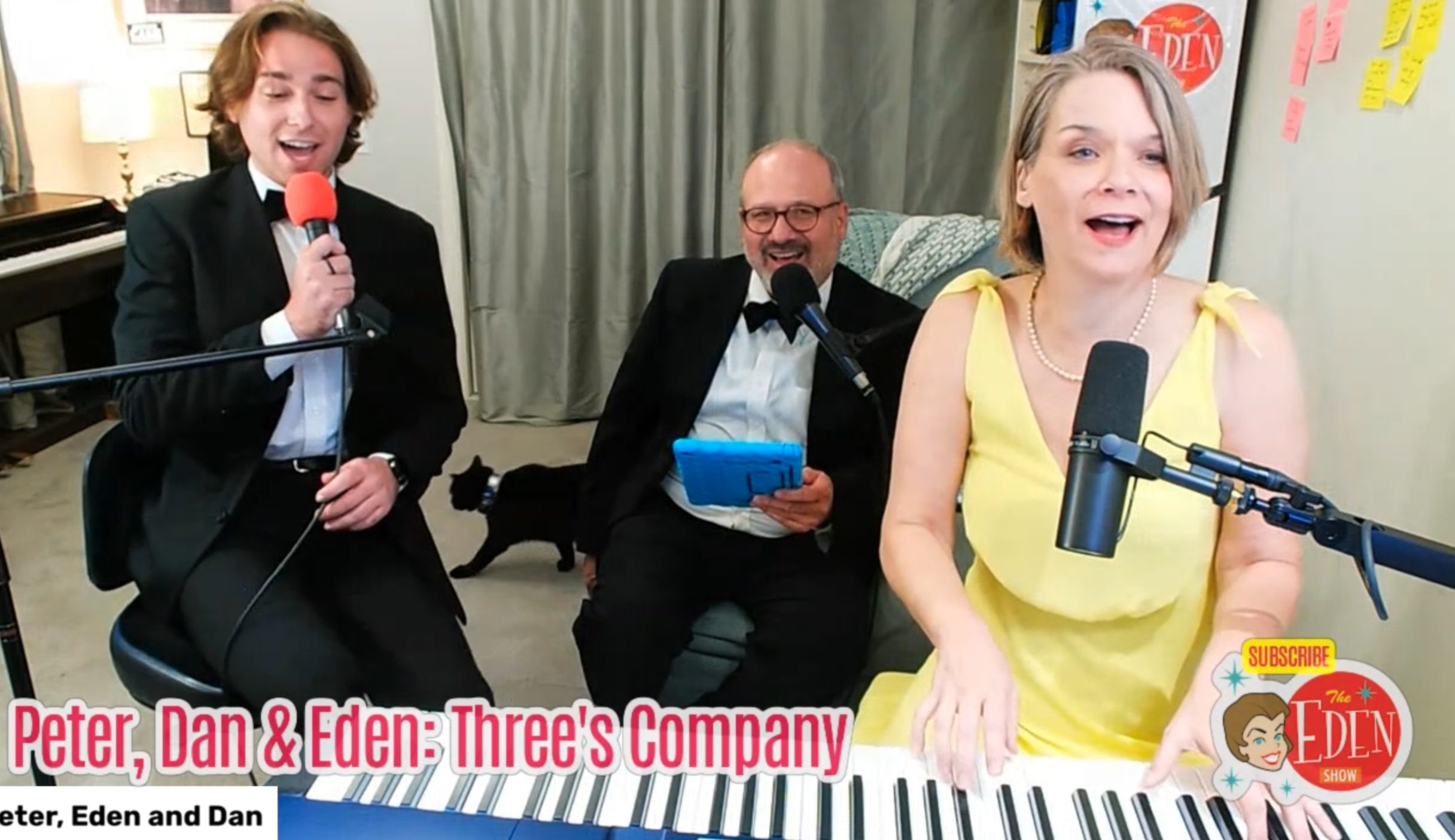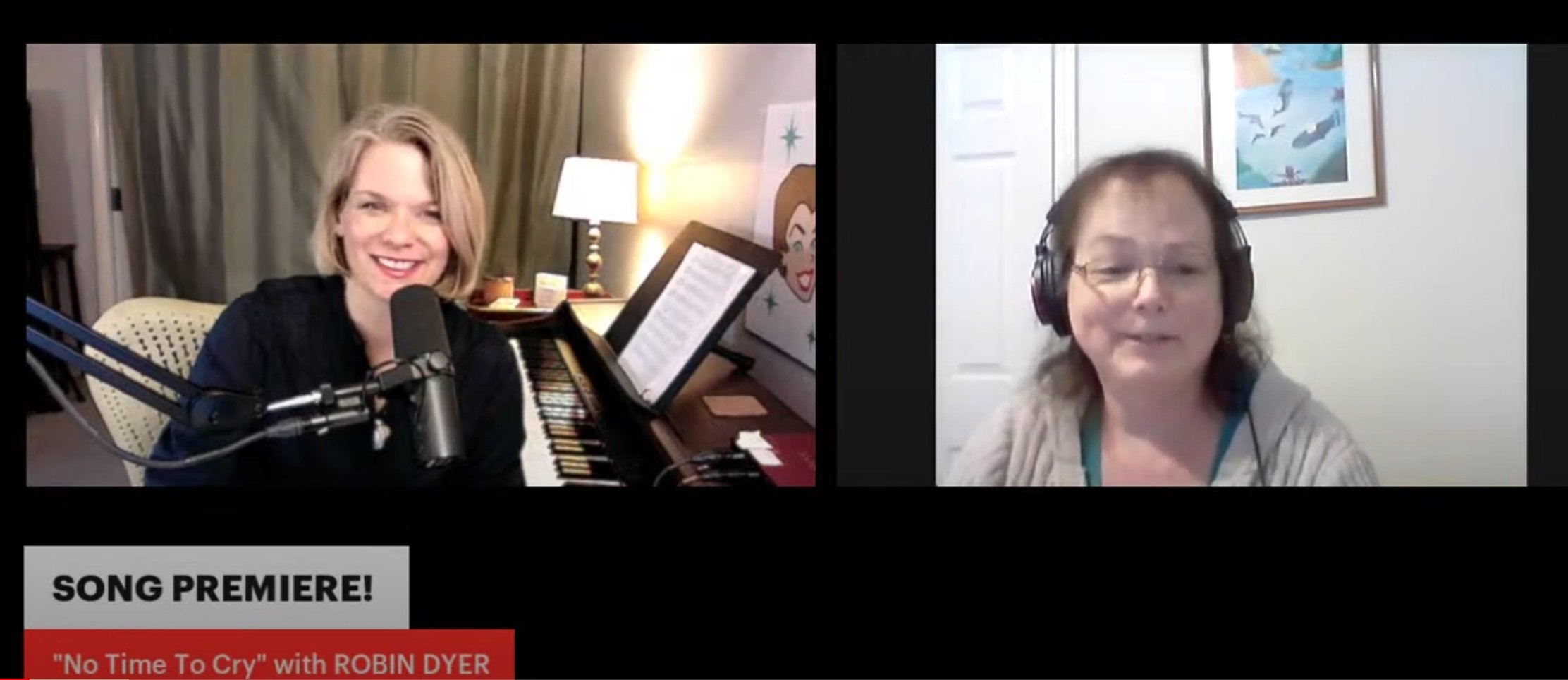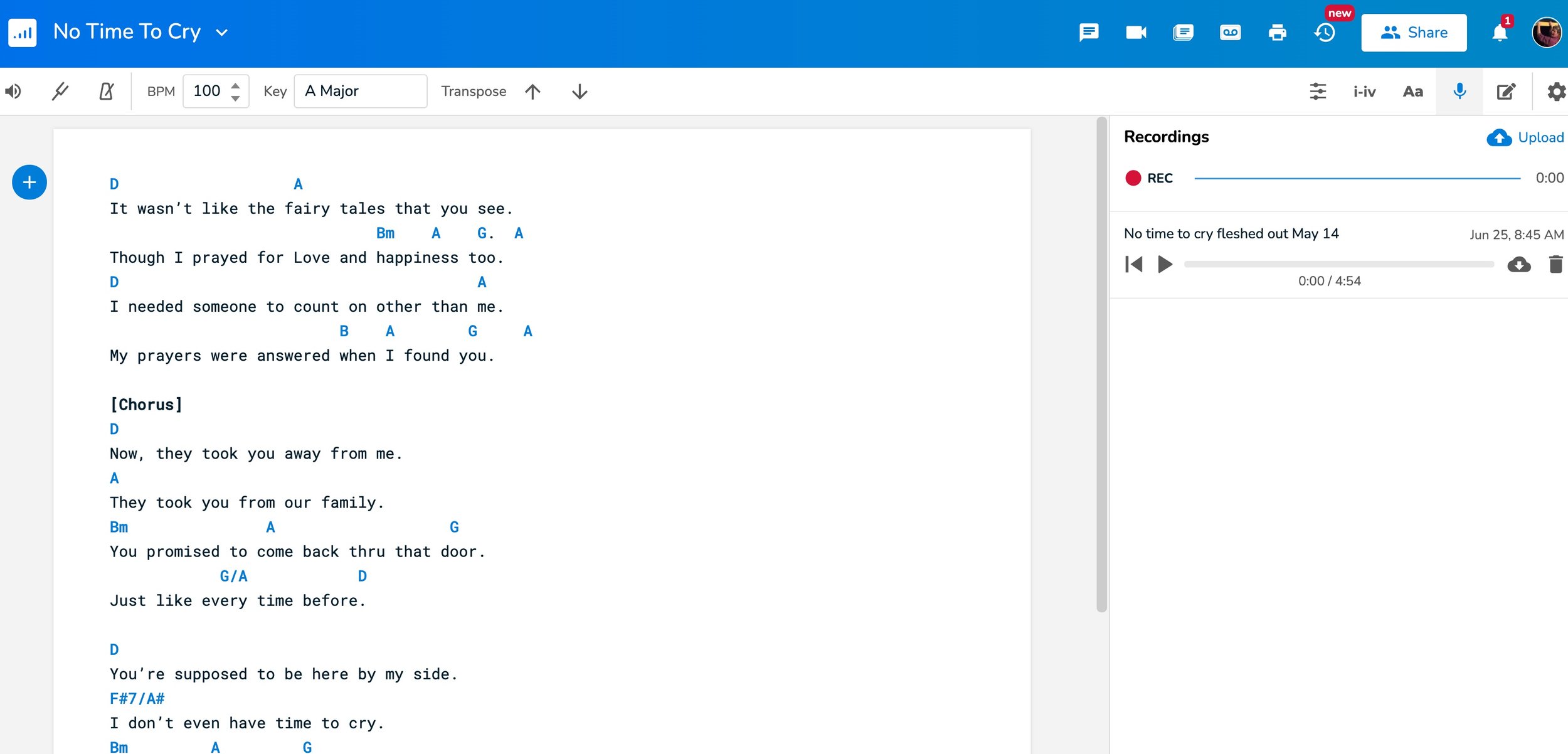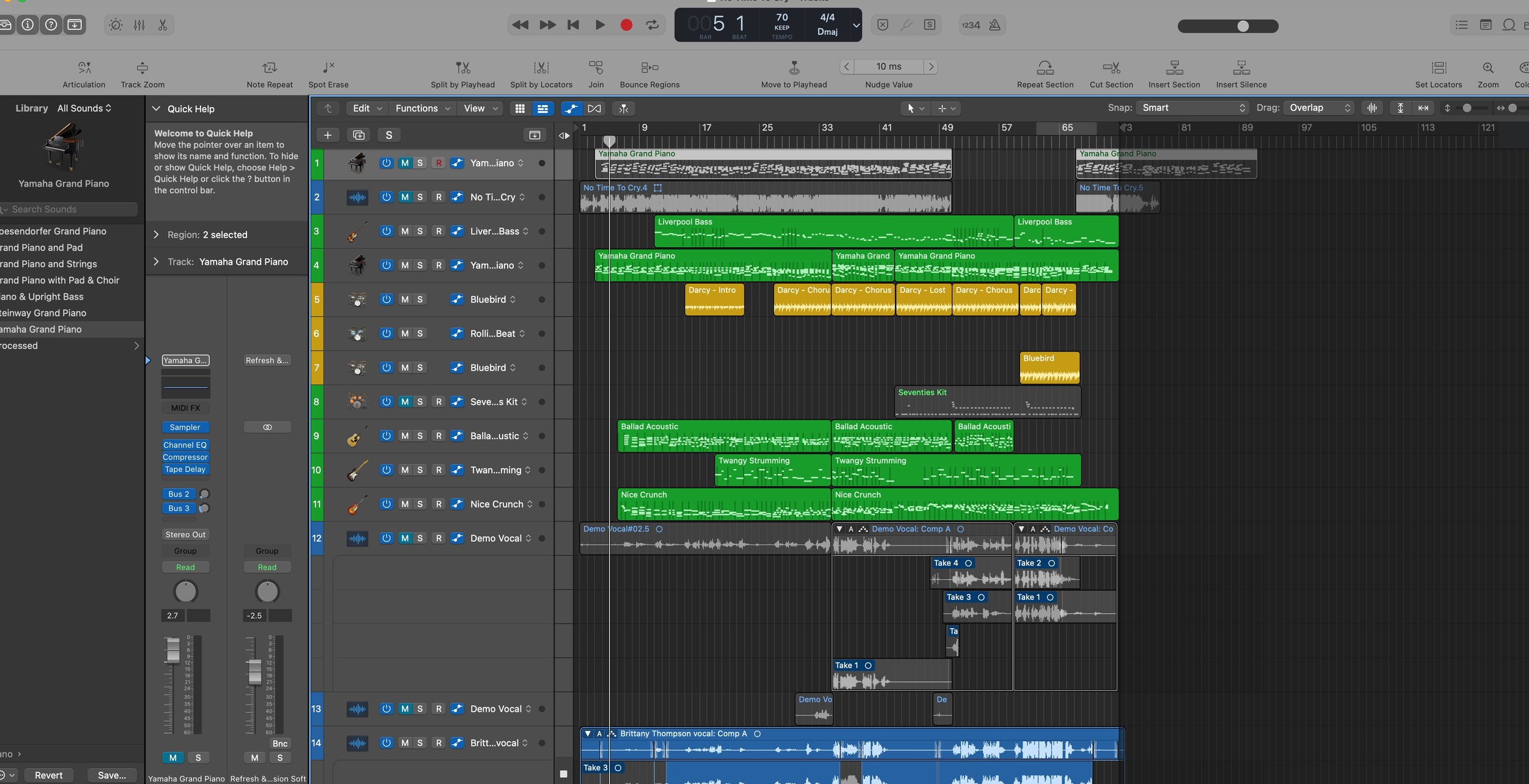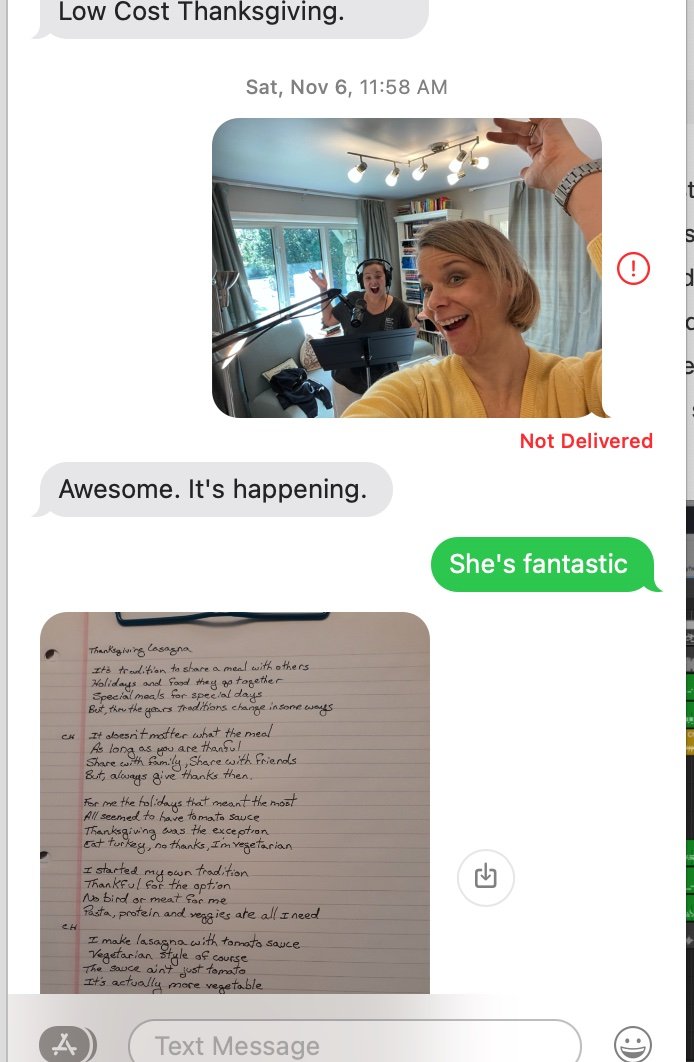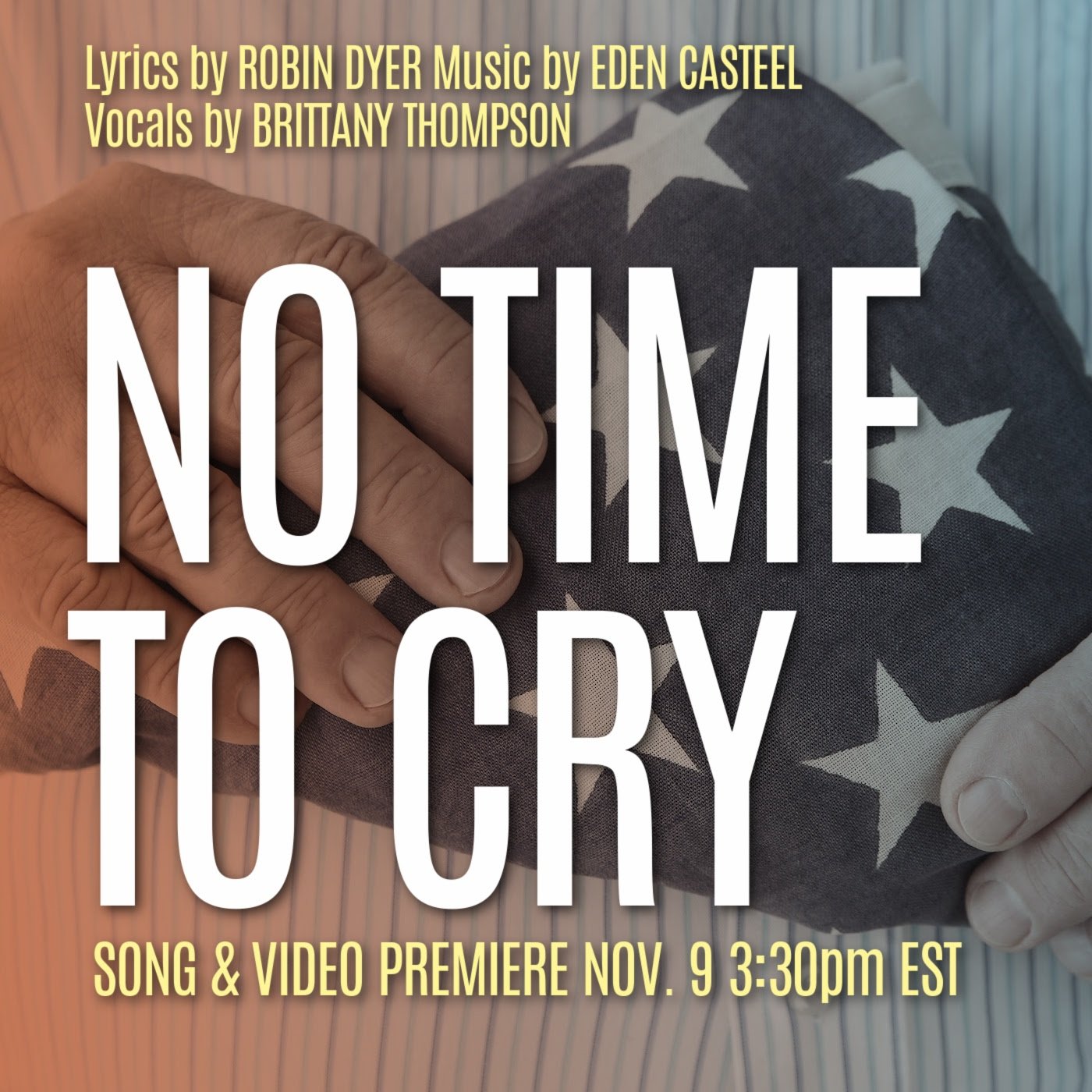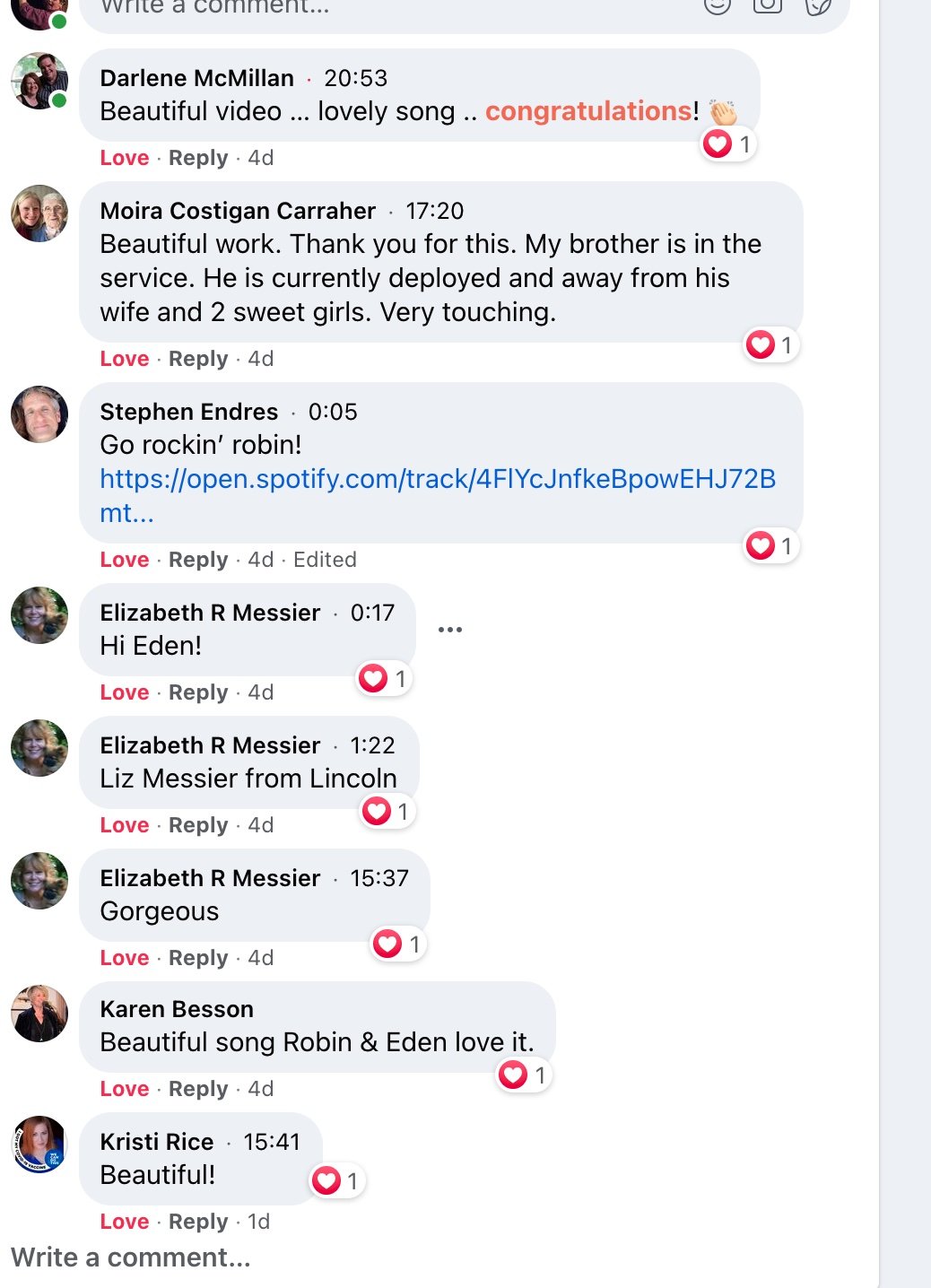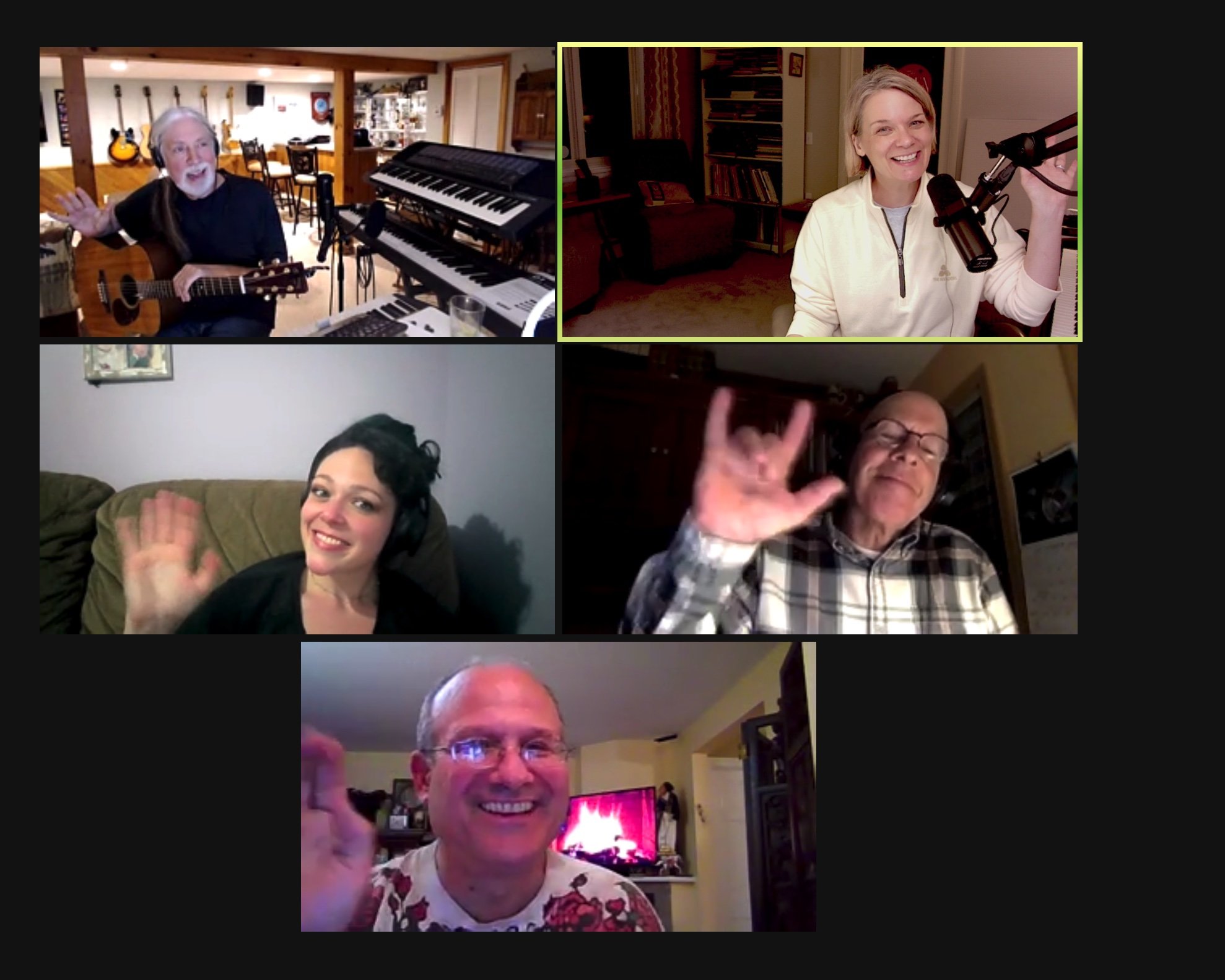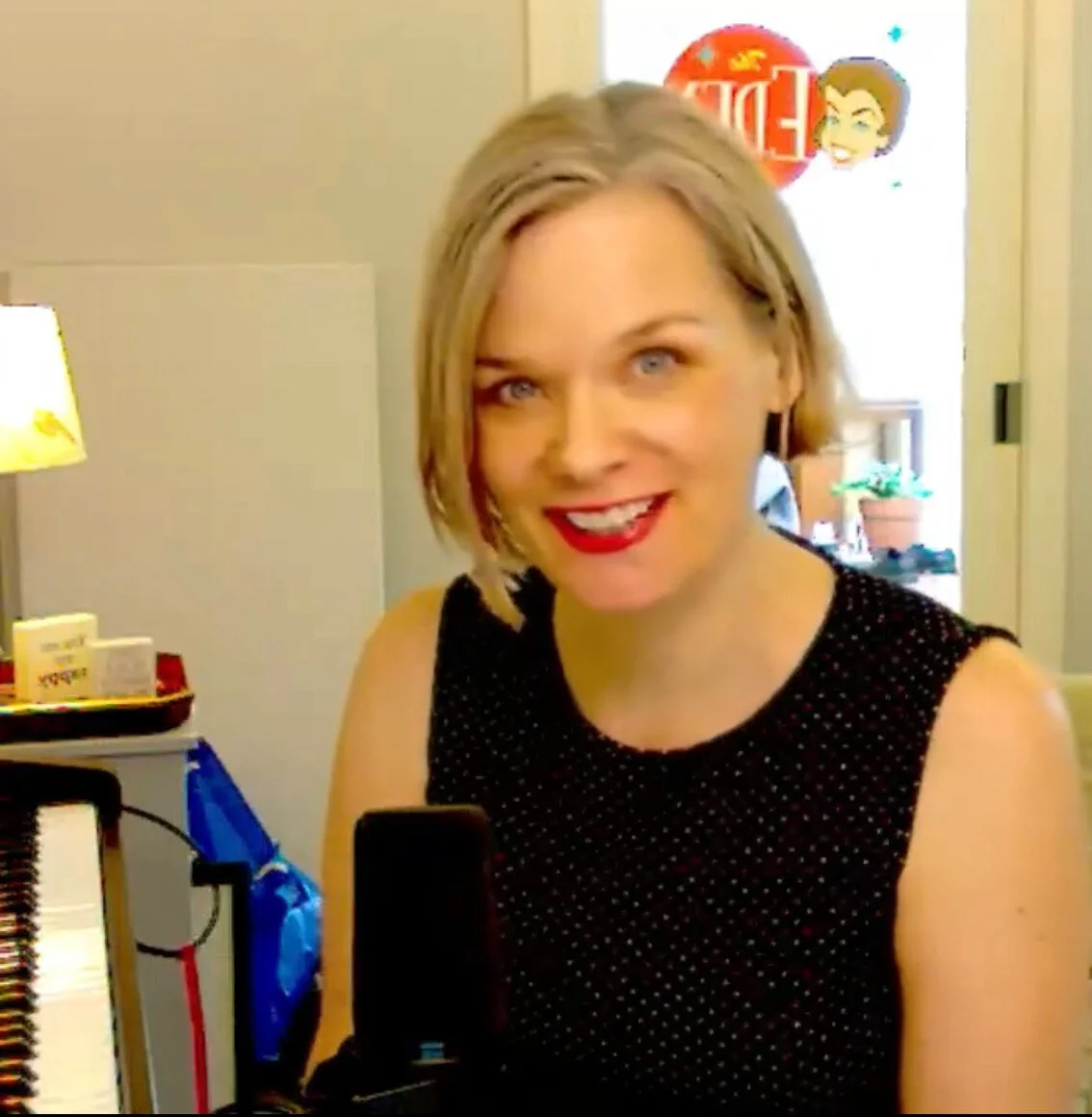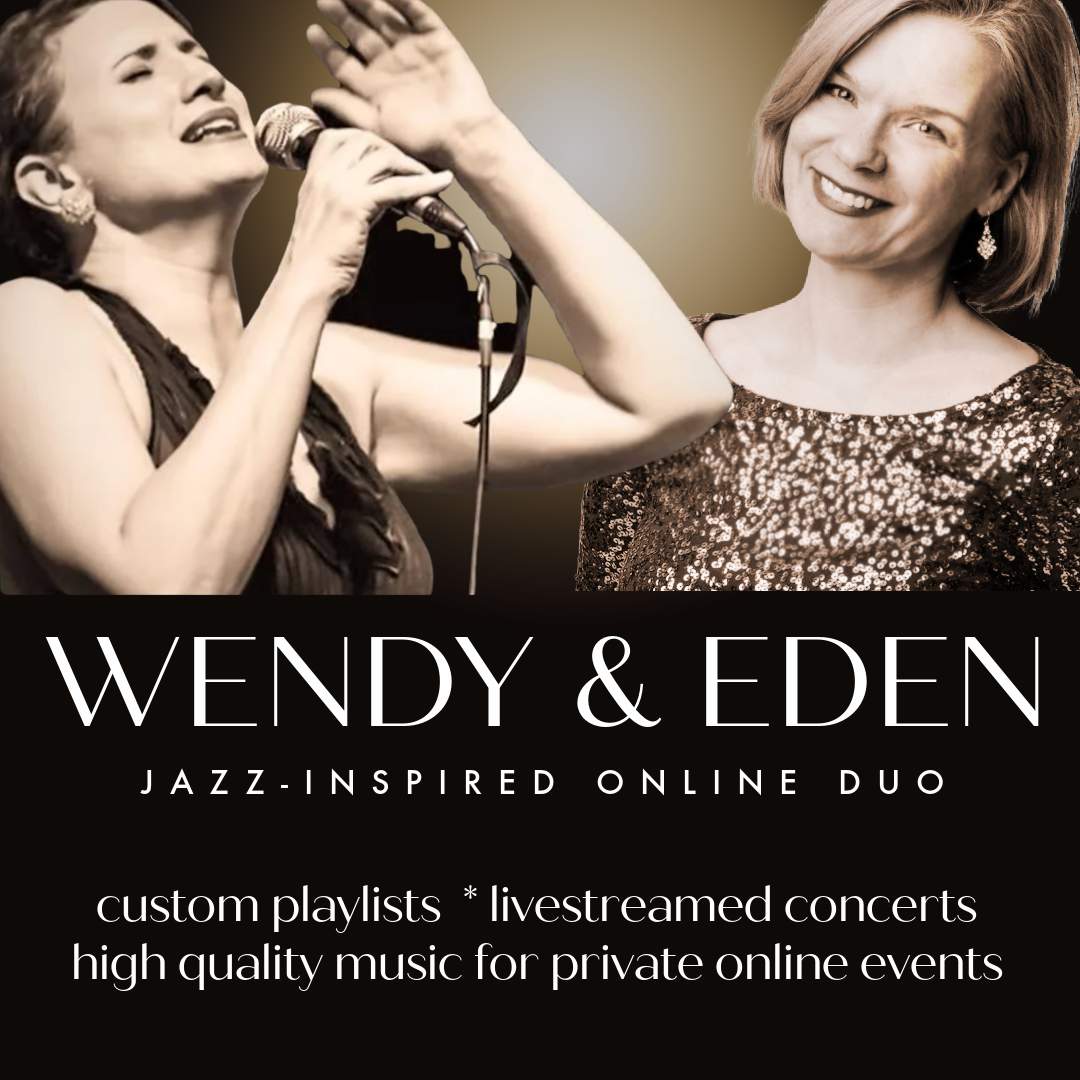Visit my Typeshare spot to read my most recent posts on music, performing, and more. I’m doing the #ship30for30 challenge of posting every day for 30 days!
I Thought It Was Love -- a new song by student Robin!
I Thought It Was Love — a new love (???!) song by my songwriting student Robin Dyer!
How "The Eden Show" was born
Hey kids! Let’s put on a livestreamed, interactive weekly musical variety show!
Read MoreIt'll never be perfect: Write songs anyway
“It’s easy! Anyone can do it!” . . . but if it’s so easy, why is songwriting so hard? . . . .
Hel-lo. We are imperfect human beings, but somehow we think songs have to be perfect in order to be shared. So, let me tell you about the imperfect creation and release of Robin’s latest song! (Watch No Time To Cry right here)
Robin has performed in a few of my showcases, but as soon as the pandemic hit, she went headlong into songwriting. She loves a lot of different styles of music and writes about a variety of things. Every time she completes a song, she takes a photo of the paper (she writes in longhand) and sends it to me, and we talk about them at our weekly sessions. I’m always amazed to get these beautifully handwritten lyrics, but she assures me, they’re not perfect. “You don’t see all the other papers,” she says. She has shown me how much paper and ink she goes through as she’s writing!
“Folded Flags” was a song Robin wrote last spring. She said it took her less than a day. (She writes about one song per day now, sometimes more! Up to FIVE songs in a day! “I’m making up for all the years I didn’t write anything,” she says.)
She writes so much that she’s basically in “writing mode” more often than not, so it’s comfortable for her to write. She always knows more words are coming, so she’s not as fixated on getting the words out perfectly. That’s a hint to the rest of ya.
Robin shared the lyrics with me at our weekly meeting. I was sitting at my keyboard and in the same hour I came up with the piano melody and a vocal line for the verses. That’s right — I just sat down at the piano and started playing something that sounded, to me, like a heartrending ballad. We both liked it. We knew we could change it whenever we wanted. That took the pressure off of being perfect. Overall, I choose melodies like wedding dresses — the first choice is often one of the best choices, even if you have a million options.
To keep us from forgetting what we liked, I recorded my musical ideas using Voice Record Pro, an app for my iPhone. I shared the audio track with Robin so we could both keep thinking about it, but we knew from the outset that it was a good lyric and the chords were lining up pretty well. We didn’t overthink it.
A few weeks later, we came back around to the song. “It it Folded Flags or No Time To Cry?” I asked her, not sure what the title would be. We went back and forth on the title for months. I mean I did! Robin thought it was funny that I couldn’t remember the title of the song we both liked. But I remembered the chorus: “They took you away from me, they took you from our family . . .” that stood out to me as a hook.
I typed the lyrics into an online program called Songcraft.io. I uploaded our original musical recording to Songcraft as well. I use this program to store a lot of Robin’s song ideas as they get built out into complete demo tracks.
Outside of Robin’s lesson time, I listened to my own original recording and started transcribing the chords above the lyrics, to create a chord sheet in Songcraft. I didn’t transcribe the vocal line, just the chords — kind of like a musical sketch.
Then, we talked about who might sing this country-esque song about a family who’s lost a loved one in war. I remembered that I had a former student who had served in the military, but was also a fantastic singer who had been a runner-up for a local singing competition. I decided to keep Brittany’s voice in mind as we created the vocal.
More weeks went by, and we kept revising the song a little at a time while working on other tunes. Robin usually writes lots of verses, and then I help her edit out what’s superfluous or redundant, until we’re left with a good lyric. I’m the sounding board as well as the music arranger.
We turned one of the verses into a bridge and I tried out a few different kinds of vocal lines for this different part of the song. I demonstrated a few bridge ideas for Robin during our Zoom meetings until we got to one we both liked.
Finally we decided it was time to get the song to a demo stage — get it sounding good enough to share. Did that mean I would play piano and have the guest singer just sing along with me? No, I wanted it to sound more “produced.” So, I opened up Logic Pro X and created a demo track. I used Logic’s drum loops, and played “bass” and “guitar” using my old Technics keyboard with a MIDI connection. I had to go back and re-record some of the electric drums to add in some fills here and there'; that to me is the most tedious part of creating a demo track. It was not perfect, but I knew it was steady enough that our singer could record to it.
Then, I sang the vocal line as I thought it should go. Finally, I sent it off to Robin to make sure it sounded like she wanted it to. She asked me to change some parts and add on some additional instrumental time after the bridge, so I did. Then it was ready.
I sent off the track and the lyrics to Brittany, asking if she would record the track — and she said yes!! Two weeks later she was in my studio, singing the song about six times total. She added a few of her own embellishments to the vocal, all of which we liked.
I texted Robin while we were recording!!! And of course Robin sent back new song lyrics she' was working on. ;)
With the recording done, I did a little post-production. I compressed the vocals and added a little reverb, and listened to the whole track carefully to make sure there were no glaring stray rim shots or clashing sounds in the accompaniment. Did it sound like Mark Ronson produced it? No. Did it sound good enough to share? Yes.
Then, Robin and I decided how to share the track. Even though the song could have been released to SoundCloud as an audio-only track, I decided to create a lyrics video. I used copyright-free, royalty-free images I found online, and strung them together in Final Cut Pro. Then I typed in Robin’s lyrics so the focus would be on the story she wrote. It took me about four hours to put together the video, working off and on during a busy day at home.
Last but not least, I did a little PR for the song. I created some graphics using PicMonkey, and shared them on my socials and to my studio newsletter list.
Finally, it was time for the premiere! I had uploaded the video to YouTube and kept it unlisted until we passed our official premiere. Robin and I got online together via Restream.io, talked about her track, and then I played the video. The comments were immediate and heartfelt . . which made both of us so happy!
So, to recap, here’s what we did, imperfectly, to release No Time To Cry:
Robin wrote a lot of words!
Eden added music, starting with some piano and then adding a vocal melody to Robin’s lyrics.
We recorded the musical ideas in Songcraft so we could find them again later. I transcribed my own music by adding chord symbols to the lyrics.
I created a demo track using my studio MIDI keyboard, and Logic Pro X.
I shared the lyrics and the demo track with our designated singer.
The singer, Brittany, came to my studio to record her vocal and I did a little tidying up of my audio tracks.
At every point of the process, Robin had opportunity to make suggestions and comments, and I changed or adapted things to suit her vision.
I created a lyrics video with some stock video, to accompany the song.
I announced the release on social media.
Robin and I livestreamed her “premiere” on YouTube and Facebook.
I look at that list of actions and think, “Wow, we did all that.” But that’s what it takes to release a perfectly imperfect song. What would I do differently to make it better? Release to SoundCloud or Spotify? Copyright the song and send to ASCAP? Yep. Use different graphics and video editing programs? Use Pro Tools instead of Logic? Add live instruments? Sure. We’ll probably copyright the song and register it with ASCAP very soon. And who knows? We might re-record it down the road.
But overall, I’m pretty happy, and so is Robin. It’s wonderful to know that her lyrics now have a life off of the page! We already have another singer and song ready to record in a month.
Songwriting is hard, right?
Songwriters are tortured, half-alcoholic troubadours who have to write about their painful life experiences. . . right?
Nope!
I just worked with three very happy, well-adjusted songwriters in my first-ever Wednesday Writing Workshop. Every Wednesday in October 2021, we met online for two hours to practice the skill of songwriting. No booze needed!
None of us had ever written a hit song, ever. All of us have written words and tried to set them to music. That’s enough of a qualifier!
In weeks 1 and 2, my songwriting students worked with my friend Ed Vallee. Ed has released albums, performs with me in a trio called The Co-Eds, and writes regularly. He’s great at it! First, we played some writing games like writing as much as possible in a few minutes, creating lists of single-syllable words, and writing about inanimate objects. The whole focus of the session was to come up with raw material for lyrics. Dan wrote about a coffee cup. Sarah wrote about a “dark green disguise.” Eric wrote about spooky Halloween! All of the writing was surprisingly deep and interesting.
In Week Two, we started with music first — a reverse of our process in Week One. This was tougher, but we rallied. We used programs like HookTheory, UnfinishedSongs.com, and royalty-free sites like Purple Planet to find music to inspire. Below, a new song called You Threw My Love On the Bathroom Floor.
Most common response: “I didn’t realize it was this easy to write songs!” Yup.
In Week Three, our ECMS friend Halley Elwell took us on a group writing excursion. Halley is a highly regarded singer/songwriter/teacher in Portland ME who sells songs for sync (say that three times fast!). She charged us to come up with a title first, then write to the title. Our title was . . Planets.
That led to lots of ideas:
And once we had a lot of ideas, everyone started contributing lines and verses, until we had this:
NOW what? Now it was time to turn those lyrics into a song. Before our final meeting in Week Four, I used Logic Pro to create three different song ideas. based on the “Planets” lyrics. The goal was not to finish a song completely; we were just seeing how the lyrics could be turned into very different types of songs depending on who was doing the arranging and what inspired them. pats self on back I don’t think I did too bad a job. ;)
So, now what? The journey from idea to song is as easy or difficult as you want to make it. The “hardest part” is different for everyone. For these songwriters, the lyrics came surprisingly easy. The music was harder, because none of them play instruments. But, using online tech like HookTheory and UnfinishedSongs.com, even that problem got solved. The takeaway: They now know how to write a song. . and they’re going to write more! pop champagne*
Submit a video (click below) and we can write songs together!
Sing, Memory
I’m performing my first cabaret in New York City in less than two weeks. Come see it!
We settled on a playlist very late in the game, so I’m now memorizing five songs as fast as I possibly can. A few of the songs I’ve known forever, but more than half are new to me.
Am I stressed about this? Of course I am! I know I sing better if my lyrics and music are memorized, but it takes me longer to memorizeI’m north of 29. But, it’s still do-able. Part of it is strategy, and part of it is what I tell myself.
Here’s how I memorize music:
I get my sheet music into some kind of organized state. I print out single copies from MusicNotes or my personal books. I hole-punch them and put them into a binder. What I tell myself: Look how organized you are, Eden!
I type out the lyrics so they fit on a single sheet of paper. I use Arial Narrow font and blow it up as big as it will go on a single sheet. This will be my “cheat sheet” so I don’t have to turn ten pages of music per song in a performance. I put this single sheet into my binder in front of the sheet music and flip back and forth between them as needed. What I tell myself: Eden, it’s okay if you just use the single page as a crutch, everyone will still love you.
I create a playlist on Spotify (here’s the list for my gig at Don’t Tell Mama) and start to play my songs several times a day (okay, more like 10-20 times each day.). I sing along. What I tell myself: You’re an auditory learner too, Eden!
I write out the lyrics on any scrap paper I can find. The action of writing out the words helps me start to recall what comes next. I will write and rewrite any “sticky” phrases that are difficult to recall. What I tell myself: This feels like Third Grade all over again, but it worked then, too.
I put songs from the Spotify playlist into The Amazing Slow Downer, an app that lets me slow down the speed of the song without changing the pitch. I use it to recall the lyrics at the speed of my brain, and little by little I speed up the track until I’m at performance speed. What I tell myself: Gold Star, Eden!
As I rehearse with my piano player, I get more repetitions in. But most of the work is mine to do before I meet with my pianist.
Years ago, I read an article by an opera singer who detailed how he memorized entire opera roles. He said he allowed at least 75 repetitions of an aria before he considered whether or not he’d “memorized” the part sufficiently. That sounds about right to me. I don’t let myself get nervous or scared until I think I’m past 75 repetitions.
By the time I’ve made more than fifty passes at a song, I usually notice that large parts of the song have moved from short-term memory into something more long-term. I notice that I can accurately sing parts of the song a cappella. I feel great when I can recite the lyrics in rhythm. When it’s really memorized I can recite the lyrics at any speed and then I feel fantastic and confident. I also start to wake up and the songs play in my “brain radio” with no prompting. What I tell myself: Oh, thank goodness, I can still memorize stuff.
But, if you are under a major time crunch, you can get music into your brain faster. When I was a college voice teacher I once had to fill in for a student singer who was injured at dress rehearsal of the rock musical Return To The Forbidden Planet. She was playing the lead. We didn’t have an understudy for her, and the director was prepared to cancel the production. Because I had coached the songs with my student, I gulped and volunteered to replace my student in the performances. In twenty hours I transformed from a vocal coach/keyboard player in the pit into the leading lady of a rock musical.
At 11pm that night after the final dress rehearsal, the director and cast stayed with me and walked me through the blocking.
At home, overnight, I slept fitfully. I woke up a few times during the night and walked the blocking in my basement, and recited the lines of the script.
At 9am I got fitted for my costume.
At noon the pit orchestra had an emergency rehearsal and I led the new keyboard player through all of the music while rehearsing all the new songs I’d be singing that night.
At 4pm I had a choreography rehearsal and they modified it as much as possible for me (I was playing an older mom, thank goodness).
At 8pm as the curtain went up, the director announced the casting change, as the audience gasped. He said I’d be carrying my script onstage and the keyboard player would be doing something similar to sightreading.
Yeah, that’s me smiling in total relief that we pulled it off! I performed that night with the script. But for the rest of the five-show run, I was completely memorized. It’s been 15 years since that weekend and I can still recite and sing every word; it’s burned into me.
Come to think of it, I probably did get about 75 repetitions in, in less than 24 hours.
What I tell myself: You’ve done this before, girl. Slow and steady, you’ll be ready.
Doing the Dumb and the Difficult
TL: DR: Waiting hurts more than doing.
Like you, I thought we’d be back to “normal” by now. But, this IS the normal. If only there was a date on the calendar where everything would reopen and stay open. I wrote a song about it, in fact! ;)
“I haven’t picked up my guitar in five months.” “I’m just trying to hang on.” “I’m overwhelmed, grateful, and discouraged.” “I’ve let fear of failure hold me back.” “My motivation just disappeared.”
These are real quotes from real clients and colleagues of mine, past and present. They completed the free, no-obligation "2021 Planning Survey” that I launched earlier this month. Their responses floored me. (You can take the survey here!)
Having places to perform and dates on the calendar gives us a sense of control, organization, purpose, and hope. When those guardrails aren’t there, it’s natural to feel like it’s not even worth picking up the guitar, writing down a lyric, taking a class on Zoom, or singing in the car. Why bother getting better just to play to your own four walls?
I invite you to stop comparing the current “Normal” to last year’s “Normal,” except in one way that might hurt a little:
The reasons you’re not making music now were there a year ago.
Blame the pandemic for ruining a lot of things, but you can’t blame it for taking away your ability to make music. You still have the ability. However, it might be buried under a lot of self-imposed conditions.
If you were only motivated by playing at open mics, you’re lost without them. If you are busy thinking about how to get everything done and don’t have room or time to practice in your crowded house — you had a variation on that excuse in 2019, too (I sure did). If you depended on auditions to give you a reason to learn a new song, then yeah, you’re out of reasons.
And if you still think Zoom and Facebook Live are the only ways you can make music online, you’re screwed. Yeah, I said it. I have spent most of this pandemic trying to show you and everyone I know that there are musical alternatives that let you play live, in collaboration with other players and in front of an audience. Are you listening? :)
Stop waiting for someone or something to sanction your musical activity. It’s in your power to play right now. Just like a certain other activity that usually gets more enjoyable even when you’re not initially in the mood, you can get into the mood for music. No candles or special lighting needed!
Step One: Do something you think is dumb. Set a timer and play three scales in one minute, then put the guitar down until tomorrow. Play wrong notes on purpose. Find a warmup video on YouTube (this one is only two minutes long!) and sing along badly, then turn it off and throw in another load of laundry. Sing, but don’t sing in your own voice. Sing in your best Kermit The Frog voice. Then do a Marilyn Monroe voice. Keep it short, and keep it dumb. Take all the risk out of it so you can put the fun back into it.
Step Two: Do something you think is difficult. Take the workshop about how to use online music tech. Come to the songwriting seminar. Do morning pages in “The Artist’s Way.” Buy a microphone for your laptop on Amazon and record cover songs. Let your kids teach you how to use social media so you can share your performing. Listen to a new Spotify channel of music you really dislike, and find two good things about it. Audition for my next studio album, even if you don’t like country music! Take a big risk. Don’t wait for months on end, in the hopes of going back to before. Normal is now.
Doing the dumb and the difficult works in and out of pandemics. Short, stupid music actitives keep you from feeling overwhelmed. Undertaking something big makes you feel like the rock star you actually are. Bring musical mojo back into your life by changing your expectations. It feels a lot better than missing what’s already gone.
Don't go off half-asked
TL; DR: Ask, so ye shall receive: Take this survey!
About a month ago my students released Holly Days, an album of original songs. It was the second studio album my private voice studio released in 2020 — here’s a link to the first one, “Six Feet From Stardom.” Heck yes I’ll take that victory lap! Most voice studios do recitals, not album releases. pats self on back
Each album was an intense three month project. It involved a thousand little decisions along the way, asking myself (and my students) questions like: This workshop presenter or that one? A chorus here, or a double chorus there? What kind of guitar to use in the demo track? Are these lyrics memorable? Are they singable? Record harmony for the ending or the beginning? Record safely at your house or mine? Release online or as a physical CD? Copyright or no? Charge per track or per album? Make a music video to go with it? Where to film that video? Who’s going to be in it? Premiere on Facebook or Insta?
Each question and answer got us a little closer to a satisfying finished product. The students had control over a lot of the project, even though I was the one doing the coaching, arranging, playing and producing. The questions and decisions kept us all in close communication.
Here’s a question for you: Did you know it takes at least seven “contact mentions” before most of us are cognizant of an event or product? You have to see the widget in an ad, hear your friend mention the widget, glance at the widget display in the store, watch the informercial about the widget at 2am, throw away the junk mail about the widget, and then see an influencer use the widget in her Instagram story. Suddenly you think, “Wow, new widget!” It may take several (hundred?) more contacts before you actually commit to a purchase.
Promotion is important, whether it’s a personal project or a huge public event, and it has its own decision process. My students promoted their songs on social media (I shared the “Seven” rule with them) and to their individual networks, and the results were satisfactory. I decided to send free copies of the album to several members of the press and in online groups. I was grateful that one of them bothered to follow up — this year especially, in a busy time of year. It’s a journalist whose work I admire.
Our phone interview was rushed, and the questions were more like monologues that barely gave me space to answer. It reminded me of the run-on non-questions that reporters ask presidential candidates in those interminable “town hall” meetings. “Candidate X, our nation’s financial health is a source of concern for many, as the Congressional Budget Office has indicated we will be running bazillion-dollar deficits for the next three generations, and Candidate Y thinks more or fewer windmills could be part of the solution or the problem if only the other political party would vote for and/or block them in a congressional bill that has yet to be written, as John F. Kennedy once said to Mahatma Ghandi . . .”
When reporters ask questions that way, I wanna go all Calvin Coolidge on them and just give one-word answers: Yes. No. Perhaps. But that doesn’t help me, the journalist, or the interview.
I did what I could to cram in some good quotes but felt lousy about it as soon as we hung up. The published article didn’t even include information on how to find the album (so what was the point?). There’s no bad press, but there’s forgettable press, which is why I’m not including a link here.
The moral of the story is: Don’t half-ass your asks.
It’s amazing what people tell you when you ask the right questions, and listen to the response. It’s frustrating to field questions that barely give you time to answer, and make you feel like you haven’t been heard (Although it can lead to some pretty great songs).
I work very hard to ask each client (and prospective client) the right questions when we meet, and to listen carefully to the answers. Asking “What do you want to learn in voice lessons?” is important, but I get more revealing answers when I ask, “What is your least favorite memory of your singing and why?” Careful questions and detailed answers help me help you.
So I have some questions to ask you, right now. Tell me the best and worst things about your musical 2020. And tell me the one thing that you think will keep you from having a satisfying, musical 2021. Take the musical survey here. They’re good questions and I know you’re going to give great answers. You can complete it for yourself, or share it with others — no strings. Finished surveys get you a free online music planning session with me this month!
What's my job? What's YOUR job?
I still don’t know how to answer when someone asks me ,“So, Eden, what do you do?”
I teach voice lessons. I also coach singers in performing. I write songs with them. I create melodies and tunes. I arrange music into performable tracks using Logic Pro. I record singers in my studios and theirs. I teach other voice teachers how to use online music tech. I advise them how to share their music publicly. I create and direct music videos with my singers. I create entire albums with my singers.
But wait, there’s more! I help them write one-person shows. I connect them with theaters and music venues. I create lists of songs they should try. I accompany them in performance. I listen to their original songs and offer guidance and advice. I play for their parties. I tell them how, what and where they should perform next, and oftentimes that next performance is an event I’ve created, booked, and promoted just for them.
I am a hyphenate teacher-creator-producer. A musical maitre’d. Tough to put on a business card!
That’s what I do. What do you do, if you’re in my studio?
Your job is to sing, create, and perform and to have a great time doing it. My job is to handle the rest (but I’ll teach you how to do those extra skills, if you want).
Do it for the joy of it. Not for approval, not as a substitute for therapy, not for a grade, not to be accepted and not for likes on Instagram. We can all tell if you’re faking.
I sing to make sound come out of my throat in a way that feels good and makes my whole day better. I perform because it makes me really, really happy. If I couldn’t sing, I would still perform. I’m thrilled that I can do both.
I teach and coach singing because I want you to enjoy the sounds that come out of your throat. I do all the rest of my “hyphen” jobs to increase everyone’s enjoyment of your singing, creating and performing.
This is why I provide so many studio-created options to my students (from social media shares to living room gigs to online collaborating to full recorded albums to showcases to one-person cabarets!). While you’re in this studio I want you to take advantage of all the options you can. (Does it scare you to think about doing any of these? Why?)
Shameless plug: Buy a Hello Session as a gift for your favorite musician (even if that’s you)! Talk to me if you’d like to create a package of lessons as a gift, any time of the year. Warning: I don’t create packages for everyone who asks. Please don’t give me as a gift to someone who’s hard to buy for. ;)
Some singers come to the Hello Session wanting to master specific songs for a specific goal (I love goals!) like acing an audition, getting into college, surviving an open mic. That’s fine! I’ll make sure you’re prepared. What’s next?
Or maybe you just want to know that you’re singing “all right.” I will tell you if you are or aren’t, and help restore you to vocal health if it’s the latter. After we determine that you’re singing all right, what are you going to do with your “all-right” voice and talents? That’s where most voice lessons stop and it’s where my “hyphenate” skills come in handy.
When you come for your “Hello Session” I see a unique individual who wants to feel good about the sounds they’re making, the performing they’re doing, and the creations they’re putting out into the world. Your job is to enjoy your singing, creating, and performing. My job is to help everyone else enjoy it right along with you.
You inspire me, and I will move the Earth for you.
"Holly Days" on the way
One week until the release of ECMS’ first holiday studio album! Original songs written and performed by students!
Read MoreKind of a Big Deal
I was this many years old when I figured out how to livestream with a jazz singer who lives about 900 miles away from me.
Why is this a Big F_____ Deal?
To the best of our knowledge Wendy Jones and I are the first who’ve successfully played live and shared live, from such a distance. So, we think it probably IS a B.F.D!
We know of no other pair of musicians who’ve done what Wendy and I did on Saturday night. Lots of players livestream by themselves or with their COVID-free bandmates from a single location (Billie Eilish!), and lots of distanced players pre-record their playing (virtual choirs!), edit the audio and video, and upload it to socials. We’ve done plenty of both. (Shameless plug for this playlist.)
It means (at least!) two musicians can play together, in real time, and can also send their music out to viewers on YouTube, Twitch, Facebook Live and other channels. It means that even in the darkest days of a pandemic, distance is no obstacle to playing live with your friends and sharing it with the world. Concertizing is available right now. This makes us feel great now, but we predict it’s gonna be reaaaaalll useful for the rest of our careers.
Musicmakers everywhere: Let’s play NOW!
Jazz singer and teacher Wendy Jones has been my tech partner-in-crime since summer. She’s a fantastic singer! She’s based in Hendersonville, North Carolina, 889 miles away from me in Wakefield, Rhode Island. Sitting at home during the pandemic, we started reading about SoundJack and other low-latency music options. We talked to each other in a teacher group called The SpeakEasy Cooperative, and we decided to see if we could connect to each other, even from such a long distance. TL; DR: It worked!
1. This was our first experiment, using Cleanfeed to see if we could collaborate with each other in real time. (Thousands of miles apart? Uh, no. Math is hard). I recorded our session, threw it into Final Cut Pro with some still photos, and released our results.
2. This was our second experiment, using SoundJack to speed up our connection. This time we each recorded video in our own studios, and I recorded the audio to my computer’s hard drive. And I put it all together in Final Cut Pro. It worked . . again!
3. Emboldened by our success, we added a third singer to our SoundJack experiments — Dr. Amy Stewart in Fort Worth, TX. And It worked again. This time, I recorded my screen video using QuickTime and threw that into Final Cut Pro.
Wendy and I then began to test our tech with other people, constantly sharing our results with each other (and on my YouTube channel! Go subscribe!) We wondered if it would be possible to livestream our low-latency music sessions, rather than record, edit and upload them. Could our tech handle it? Yes, yes it could!
Was Saturday night’s “live rehearsal” perfect? No. I had to ask my desktop Mac to give me quality video, excellent audio, and then bounce it all live into a different platform. We had some difficulty hearing each other at times, and viewers told us that sometimes there was a faint echo, or it was difficult to hear my piano (which sounded really loud to me, live!). This is a lot to ask of any consumer-level tech.
But you bet your bippy I’m going to keep asking my tech to make the impossible possible. Wendy and I have music to make! Subscribe to get notified when Wendy and I do our next Long-Distance Livestream!
Pandemic-Proof Singing: Yes, Really
TL;DR: See you next week, musical optimists.
Theaters are shut. Broadway is in mothballs. Music venues are closing left and right. Singers and voice teachers connect online for safety. Musicians are out of work and draining their bank accounts dry.
What a great time to look ahead!
I’m not crazy, I’m an optimist! As awful as this time has been (and yes, it’s awful and it’s especially awful for those who have lost someone), I’m excited to see incredible innovation in the music world.
Teaching online, we’ve discovered that it’s easier to hear our singers when their sound is coming into our headphones. Playing online, we can make music in real time with programs like SoundJack and JamKazam and collaborate with players thousands of miles away, even total strangers! Forced inside, almost everyone’s writing new songs, creating new works, and connecting to old fans and new audiences online.
It’s not the same as what we had before, but it sure is interesting. And, these innovations are open and usable by everyone! I believe the musical landscape has been permanently changed by what we’ve learned and created in the past year. So to me, the musical future looks bright. We just need that danged vaccine.
Here, have a swig of my optimism. I’ll see you at The Pandemic-Proof Singer Summit, a really cool online event, Nov. 16-18. My friend and colleague, performer Danielle Tucker of The Mighty Untouchables, is sharing survival skills for the pandemic and beyond. She’s gathered together an amazing group of presenters to share their wisdom and knowledge about the music biz before, during, and after pandemic.
Learn more about monetizing live online concerts, managing a website, managing your Spotify tunes, keeping your body and voice in shape, how to use your music gear, attracting fans online, and so much more. The videos, workbooks and freebies contain valuable information and skills you needed before the pandemic, but were too busy to learn. But if you master them now, you’ll truly be pandemic-proof.
And, I’ll be there too, giving a workshop called “Online Performing: What The Tech?” to help you improve your online music gigging.
Guess what? It’s all FREE! Click here to sign up now.
Can’t make it Nov. 16-18? You can get ALL the videos in your inbox, permanently, for less than $200! Use my code to get the lowest price!
Christmas Is Already Here
Christmas always comes early for musicmakers! Here’s what ECMS is up to for the holidays.
Read MoreDo you really need a voice teacher?
TL; DR: Maybe, maybe not.
After a promising start in middle school, my performing career was going nowhere. My confidence had been shaken when I, the upstart who stole the show in “Coming Of Age” in Seventh Grade, was totally shut out of “You’re A Good Man, Charlie Brown” in Eighth Grade. I didn’t look or sound like a Lucy or a Sally and that’s all that was available. I was crestfallen. My mom thought, “Let’s get her some voice lessons and see if that helps.” And sure enough, two months after I started studying with Prof. Paul Hickfang of Ohio State University, I was singing “As Long As He Needs Me” in a transposed key at the spring choir concert. Voice lessons work!, I thought. I kept taking them.
Most of the singers who come for a Hello Session with me are frustrated a little bit vocally, and a whole lot professionally. They audition for the same few shows in the same few theaters. They get feedback like “sorry, there were just so many good people for only a few parts.” They love singing with their choir friends but they’re bored to death with the material, and the soloists always get hired from outside, anyway. Their audition experiences are tedious or terrifying and they rarely have the right songs in their audition books. They aren’t sure open mics are for them, either. They don’t look like Jasmin in “Aladdin Jr.” so they get cast as a townsperson, again. They’re singing the wrong music, at the wrong venue, for the wrong reasons, in the wrong key, at the wrong time.
Can a voice teacher solve all of these problems? No. You need a voice teacher AND a vocal coach, career counselor, repertoire specialist, talented pianist, talent agent, director, public relations person. And a drill sergeant. Voice lessons will build your voice, but what you really need is to expand your options. That takes a lot of additional skills and support. I didn’t get that help when I was thirteen and struggling to find my way to the mic, and it’s still a challenge to find it now.
You don’t need a voice teacher. You need an “All-Of-The-Above” teacher who can not only tell you to stop using “Hallelujah” to audition for The Music Man (please stop using “Hallelujah” altogether, okay?) but can also tell you to abstain from local theater auditions altogether, pull out the ukulele, and get working on the EP that’s been swimming around in your brain for a few years. And can then spend the second half of your lesson helping you write a song.
You need a voice teacher who can help you arrange your cover song setlist so you don’t get vocally tired in the middle, and help you find open mic venues that don’t have a six-hour waiting list. Or teach you how to livestream and avoid the lines altogether.
You need a voice teacher who can help you write, arrange, and record your songs in keys and styles that work for your voice, help you release them, and coach you as you take them on the road. Who can help you organize your vocal interests so you really can do it all.
You need a voice teacher who tells you it’s okay to quit choir, and then gives you a chance to sing rock and roll with her studio band. Someone who can also say, “check out this Italian aria from the 18th century, I think it would be a great way for you to work on your falsetto for that Prince song.”
You need a voice teacher who understands not only your voice but YOU. Someone who sees options and possibilities that you can’t see for yourself. Someone who helps you create a musical life that celebrates who you are and points you where you’re heading.
If you can find all of this in a voice teacher . . . .well, it’s nice to meet you! ;) Let’s get going. Book an online Hello Session with me here.
SoundJack: A Musical Holy Grail →
Is SoundJack the Holy Grail for musicians? . . .
Read More(Some of) Eden's Favorite Studio Things!
What to get the singer who has everything? . . . .try items from this list!
Read MoreAsk Me Anything: The Questions I'm Asked The Most
As soon as people find out I'm a voice teacher, I usually get the following questions.
Q: "I can't sing!"
Not a question, but in fact it is. Properly translated, the question is: "Can I sing?" or "Can *I* sing?"
A: Yes. But if you take lessons, you'll probably be happier, and a better singer! Voice lessons help keep your voice healthy and can steer you to the right music for your voice.
Q: Do you sing opera?
A: Yes. But I also sing other stuff.
A bit of "Der Holle Rache" from Mozart's Die Zauberflote, followed by "I'm The Queen And You're Not" from a coloratura cabaret in Michigan, 2010. Music and lyrics by the incomparable Fred Barton.
Q: Should I take lessons at the same time each and every week?
A: If you want to, sure. Students who take more frequent lessons will see faster progress. But, it doesn't have to be at 3pm every Wednesday for the rest of your life. I offer flexible scheduling because I'm busy too!
Have a lesson on Friday at 5, then switch to an online lesson on Tuesday at 7. Students who buy a semester of lessons can schedule them any way they want -- four lessons one month, seven in the next, two at the end, then a whole month off. It's up to you!
Q: Should I sit at the piano and practice for two or more hours a day?
A: Only if you want to burn out! Practice frequently, but break it up into smaller sessions. It all counts. Vocalize in the shower. Check out your tongue position while you're combing your hair. Practice your warmups in the car (sing along with the mp3s I send you of your lessons).
Be aware of how you use your voice in speech during the day. Use the "think system" and play air piano at your desk. The mental work you do contributes greatly to your progress! And yes, devote regular focused time to learning your lyrics, rhythms, and melodies. Record your practice and LISTEN and WATCH for even better results.
Q: To sing pop, rock, or Broadway I need to study classical singing, right?
A: Nope! That would be like telling a football player that the only training he needs is tap dancing. For centuries, voice lessons have been associated with classical music. But now we have voice teachers who can train singers to sing in any style they wish {points to self}.
All singers should understand how the voice functions to make style-specific sounds. (Why does Shakira do that? How does Michael Buble sound like himself? Why can't I sound like Gwen Stefani except when I have a head cold?) In your first lesson I'll give you a short anatomy lesson to explain how your voice works, and how different styles affect what your voice does.
Classical is only one of the many styles that all voices can learn (or at least try!). But, just as some football players have found that ballet has made them better players, many non-classical singers find benefit from knowing how to sing a little bit "classically." It's all good.
Have a question? Ask me anything!
Have a question? Ask me anything!
What I'm Doing Now
As of August 5, I am . . .
1. Slowly preparing for college (as a teacher, and as the mom of a freshman leaving the nest)
2. Rehearsing the sixth and final Quonnie The Musical with my talented young cast
3. Celebrating another birthday (along with Loni Anderson and Patrick Ewing)
I hope you're having a great week!
What I'm doing now
As of June 17, 2016, I am:
Celebrating my son's high school graduation . . . (I got all verklempt) . . .
. . jamming with my family band . . . (that's my dad Ron and my brother in law Robert) . .
. . .and rehearsing with Jason Shealy for our June 25 concert! Broadway, Disney, and gospel! . . . . click here for info!
What I'm doing now
As of June 10, 2016 I am . . .
Writing down songs I might use in the sixth production of Quonnie The Musical
Typing out lyrics to memorize for my June 25 concert (info right here)
Scraping a badly painted deck so it can be repainted
Preparing to cry at my son's high school graduation
Inspired by Cait Flanders.
